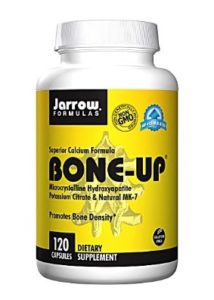From a young age, most of us have known the importance of building and maintaining strong, healthy bones. This is especially top of mind for women as we age into our 40s and beyond. Not that healthy bones aren’t important for men, but osteoporosis is more common in women, especially beyond menopause (largely because of decreasing estrogen levels).
Osteoporosis—which literally means “porous bone”—is a disease in which bones begin to lose their structural integrity over time. In its early stages, physical symptoms can go unnoticed. In later stages, bones start to weaken, bone loss begins to surpass the rate of bone formation, and risk of fractures increases.
Ideally, we should think about preventive strategies long before we reach this potentially painful and disabling stage. If you smoke, are over 50, or have back pain or a chronic illness, consider asking your doctor about bone mineral density testing. A DEXA scan, using low levels of X-ray, is one of the simplest and most reliable ways to measure bone density and check for osteoporosis. In the meantime, here are strategies to build healthy bones throughout your life.
Omega-3 fatty acids
Intake of these has been positively associated with building new bone and protecting against bone loss. The typical Western diet tends toward an imbalance of consumption of omega-6 fatty acids compared with omega-3s. This is bad for the bones; a recent study showed that individuals who consumed a higher ratio of omega-6 (soybean oil, corn oil, safflower oil, processed foods and snacks) to omega-3 fatty acids tended to have lower bone density than people with a lower ratio of the two fats. Top sources of omega-3s include sardines, wild salmon, herring, walnuts and cod liver oil, as well as chia, hemp and ground flax seeds.
Vitamin D3
Sufficient vitamin D intake is associated with a lower risk of hip fractures in postmenopausal women with osteoporosis. Sun exposure and foods like fatty fish, cheese and liver are all good sources of vitamin D, but many of us fall short when it comes to getting adequate amounts. Ask your doctor to measure your vitamin D levels (via blood test) during your annual wellness visit. Recommended supplemental doses for osteoporosis prevention begin around 2,000 IUs daily.
Supplement your skeletal support with Jarrow Formula’s Bone Up
Weight-bearing exercise
Current research suggests that just walking may not be enough to protect our bones. Add higher-impact and resistance training, such as jumping, lifting weights, running or wearing a weighted backpack during your walk. The more lean muscle we maintain as we age, the more we protect our bones and keep them strong.
Plant-based diet
The multitude of micronutrients—including vitamin C, calcium and magnesium–in fruits and vegetables act synergistically to reduce bone turnover, stimulate bone mineralization and prevent calcium loss through the urine. Dark-green and leafy vegetables, such as spinach, kale, chard, broccoli and Brussels sprouts, also contain vitamin K1, which supports bone building. Because vitamin K is fat-soluble, healthy fats aid its absorption—so drizzle olive oil over those greens, or chop up avocado for a side. Certain fruits, including avocados, kiwis and grapes, also provide vitamin K.
Why Didn’t Calcium Make the List?
The research on calcium supplementation is mixed, so I recommend to include calcium-rich foods in your diet, such as cruciferous and dark-green, leafy vegetables. Fermented dairy products like unsweetened yogurt may be beneficial, and I typically recommend about a ½ cup before bed, when our bodies get busy laying down new bone.
Dr. Debra Rouse is a registered naturopathic doctor and cofounder of Live Naturally.



